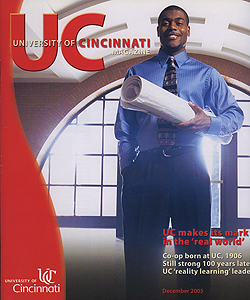By John Bach
Karl Zimmer runs a plant with 300 employees and a $60 million budget. Not bad for age 29.
Zimmer credits hard work, a little luck and co-op at the University of Cincinnati, particularly his international co-op experience, for his success. The 1999 industrial engineering student co-oped four quarters with General Electric Aircraft Engines in Cincinnati before GE sent him overseas to Daimler-Benz Aerospace, a partner in Munich Germany, where he spent two quarters working on an international co-op assignment. Today he is plant manager for General Cable in Jackson, Tenn.
"Being able to experience different cultures and different ways of thinking for six months in college was invaluable," Zimmer says. "If you are able to work overseas and survive and be successful, you have some instant credibility that will take you 10 years in the work force to develop without that experience."
Gayle Elliott, MS (DAAP) '93, Eve '96, director of UC's international co-op, regularly hears similar feedback from students and alumni who spend time in the world work force.
"To see how much they learn and the understanding they develop of another culture is just amazing," she says. "They really feel they can do anything. They learn that they can take risks, and they can succeed."
Elliott has seen international co-op evolve from its beginning in 1990 to its current national model. Today, she typically places about 20 co-ops in Germany, 10 in Japan and a few more in Mexico and Chile. All of those go abroad from the formal international program after Elliott lines up their employment.
But first, the students are required to go through 300 hours of intensive language training. A couple of dozen additional UC students go on international assignments each year without the language training.
In those cases, a student might have a contact with an overseas company, or their co-op employer in the U.S. ships them to a foreign branch in places such as France, the UK, India or China. In one quarter last year, UC sent 56 co-ops to 16 countries.
"What makes us unique is the combination of the specified language training, the prior co-op experience and the international experience all together," Elliott says. "Employers are amazed at what our students can do."
Karl Zimmer says his co-op in Germany helped his career tremendously, particularly in managing multi-million dollar projects involving international facilities.
"I look at people who went to Ivy-League schools and private schools, and they are still paying off college loans five and six years after graduation. I came out of school debt free, with a good job and started on a good career path.
"It was a great value," he says. "Of the value of my UC education, I would have to say 80 percent of it came from co-op, and 20 percent came from the classroom."
Before international co-ops jump on a long flight, however, there is plenty of work to prepare for what is often the opportunity and experience of a lifetime. Students typically declare their interest in the formal international program in their freshman year. The actual international experience is normally held for their final two co-op quarters and only after they have completed four co-op quarters in the states.
For the bulk of the students, who head off to Germany, Japan or South America, the most demanding aspect of the program is the intensive culture and language training. Prior to their international co-op, students are required to learn either German, Japanese or Spanish by taking part in a six-week program that meets five days a week and eight hours a day. Next, they take two additional quarters of language. Finally, they spend two weeks as a group at an in-country language school before splitting off to their individual assignments.
Sarah Gray, Eng '98, co-oped at a civil engineering firm in the former East Germany. "It was so amazing to hear my German co-worker's stories about food shortages and other tales of the old East German days," she says. "The personal relationships across language and cultural barriers were outstanding. I still e-mail my German mentor regularly."
Gray's co-op firm in Dresden restored old-world buildings and churches firebombed during WWII, and that experience led her to a master's degree in historic preservation. Today, she heads up historic preservation for a consulting engineering company in Toronto.

